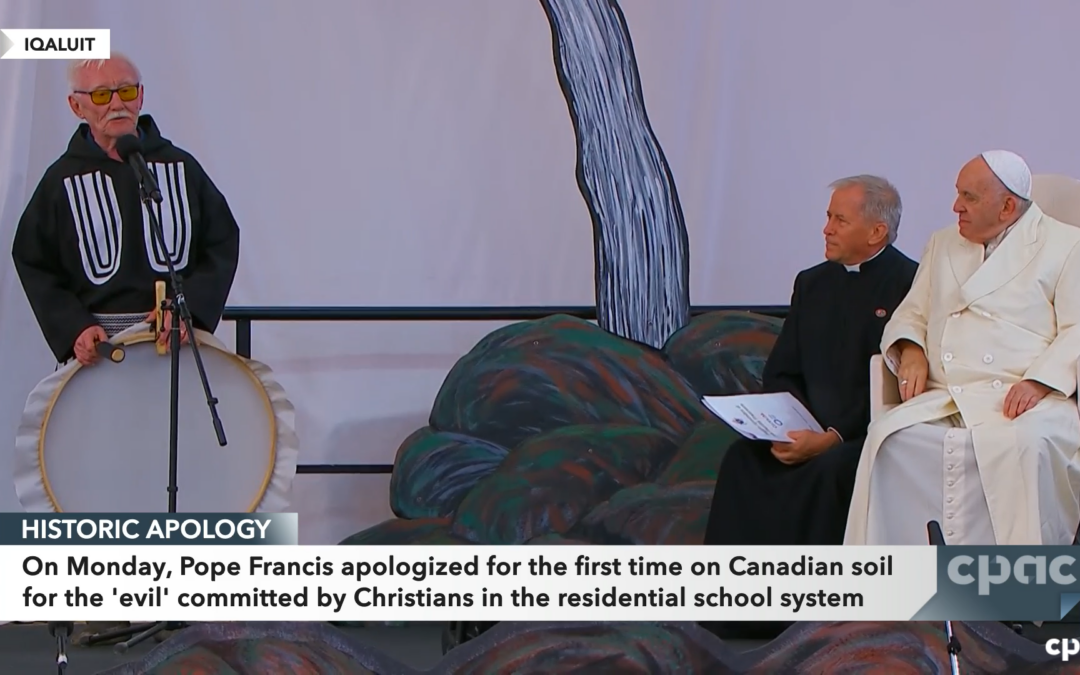Pope Francis has officially wrapped up his Canadian visit and is on his way back to Vatican City.
The final day of the papal visit saw Francis address Indigenous people and residential school survivors in two different locations.
On Friday morning, he addressed a small delegation of Indigenous people in Quebec City before travelling north for a large crowd gathered to see him in Iqaluit.
In his address at the archbishop’s residence in Quebec City, Francis spoke on what he called his “penitential pilgrimage” pointing again to the Catholics who caused immense harm in Canada’s residential schools.
As his pilgrimage is ending, Francis spoke on his desire for “walking together” in reconciliation and that he will be returning home “greatly enriched.”
In Iqaluit, during his final papal address in the country, Francis was welcomed to Inuit territory with traditional throat singers and drummers.
Once again Francis thanked residential school survivors for sharing their stories and spoke of the harm caused by Christians who committed ‘evil’ in the residential school system and apologized for the role of the church in this system.
“In this place I want to tell you how very sorry I am and ask for forgiveness for the Catholics who contributed to the harm in these schools and the culture of assimilation and disenfranchisement,” he said.
The pope then spoke on the resiliency of the Inuit people and all Indigenous people in Canada and the strong connection Indigenous people have with the land.
“There is a beautiful relationship between you and this land you inhabit because it is also strong and resilient and responds with brilliant light to the darkness that often surrounds it, yet this land like every individual is also fragile and needs to be taken care of.” Said Francis then speaking to Inuit youth directly. “Caring, teaching, and learning how to care is what young people have been called – care for your people, care for the Earth, and care for your history.”
The pope would then invoke the team work required for a successful hockey team as an analogy of the importance of working together in reconciliation.
When Francis finished his address in Iqaluit he would shortly board a plane on his way back to Vatican City concluding his historic visit to Canada.
“Rescind the Doctrine”
Many survivors have spoken favourably of the papal visit to Canada and what an apology from the pope on Canadian soil means for reconciliation, however, many indicate concrete actions need to follow the apology.
These calls for action include the return of Indigenous artifacts, the release of documents pertaining to residential schools, and possible monetary reparations. However, the main action that came to the forefront throughout the week would be mounting pressure for Pope Francis to rescind the Doctrine of Discovery.
At one of Pope Francis’ stops in Quebec City, protesters held a large sign that read “rescind the doctrine” before Francis was set to hold a Mass in the city.
As well, many Indigenous leaders and survivors continued to make calls for the pope to officially renounce the doctrine throughout the week – something Pope Francis never mentioned during his time in the country.
On Wednesday, the Canadian Conference of Catholic Bishops, who organized the papal visit, announced they are working with the Vatican in hopes of issuing a new statement from the Catholic Church on the Doctrine of Discovery.
What is the Doctrine of Discovery?
The Doctrine of Discovery is a series of decrees by the Catholic Church in the 15th century as European expansion began. These documents gave Christian’s sovereignty over any newly discovered lands and were used by many European explorers to displace Indigenous people during colonization. According to some experts, the series of documents would also be used for some of Canada’s sovereignty claims in the 19th century.
While the doctrine doesn’t necessarily take a forefront in the policy of the Catholic Church in 2022, Many Indigenous leaders and residential school survivors believe having Pope Francis officially renounce the doctrine will have great affect to help lessen the colonial harms they believe were caused as a result.
With the Catholic Church often a slow-moving institution, there may not be any official decision on the Doctrine of Discovery from church leadership for sometime.
However, while Indigenous people across Canada have shown their appreciation for the papal visit to Canada and what an apology on Canadian soil will mean for reconciliation, they clearly showed the papacy a tangible step they believe can be taken for future reconciliation efforts – “rescind the doctrine.”
(PHOTO: A CPAC screenshot of Pope Francis listening to a traditional Inuit drummer welcoming him to Iqaluit. The drummer would gift the drum to Francis in order for him to remember the Inuit people.)
Support is available for anyone affected by their experience at residential schools or by the latest reports.
A national Indian Residential School Crisis Line has been set up to provide support for former students and those affected. People can access emotional and crisis referral services by calling the 24-hour national crisis line: 1-866-925-4419.
Mental health counselling and crisis support is also available 24 hours a day, seven days a week through the Hope for Wellness hotline at 1-855-242-3310 or by online chat at www.hopeforwellness.ca.
